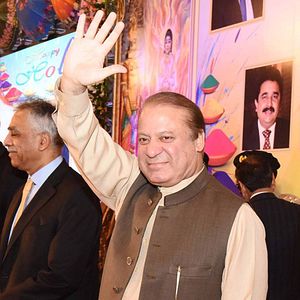Pakistan’s former prime minister and the founder of the Pakistan Muslim League-Nawaz (PML-N) party, Nawaz Sharif, was released from prison recently after the Islamabad High Court suspended his 10-year sentence, which had been handed down in a controversial corruption case. About a year ago, Sharif was disqualified from the premiership after the Supreme Court of Pakistan found him guilty in a significant corruption scandal.
With Sharif’s party losing the recent general election, he doesn’t have any direct role when it comes to becoming part of the government in any form. So what’s next for his role in Pakistan’s politics?
Pakistan’s current government, which is led by Imran Khan of the Pakistan Tehreek-e-Insaf party, has for years criticized the Sharif family’s politics. Some analysts consider Khan’s anti-Sharif politics not only a game changer for his own party’s political fortunes, but also a reason for Khan’s better relations with various state institutions in Pakistan. Sharif is not known for having good working relations with the country’s top civilian and military institutions. One of the reasons for Sharif’s inability to develop better ties with various state institutions stems from his politics of “going it alone” when it comes to taking strategic decisions.
For the past couple of years, Sharif focused on projecting himself as a leader whose politics are embattled due to the growing pressure of various political groups, which may have had the support of different state institutions such as the country’s judiciary. For some time, the country’s top judiciary has taken a special interest in the Sharif family’s politics and have ignored a number of other cases and politicians that have also been accused of fostering corruption in Pakistan.
While it’s unclear whether Sharif made a deal with the current government to win his freedom or the court decision to suspend his sentence was an independent verdict, the founder of the PML-N is not going to remain quiet when it comes to the alleged exclusion of his political party.
As of now, Sharif’s court cases are ongoing: the Islamabad high court may have suspended his sentence, but that doesn’t mean that various other corruption-related cases against Sharif have now been rendered moot. Arguably, the decision related to Sharif’s fate will depend on his politics outside the prison.
If Sharif’s freedom is a result of a political deal, then it’s likely that the former may not gain an active role when it comes to joining the country politics immediately. It is likely that Sharif’s younger brother, Shahbaz Sharif, who is known for having a workable relationship with the country’s top institutions, may have reached an agreement with various institutional stakeholders whereby Sharif would not take an active role in politics.
However, it’s unclear whether Sharif is part of the deal, which his brother may have linked with the country’s top institutions. Moreover, one can argue that, unlike the pre-election politics of agitation against various state institutions, Sharif may not go after the country’s judiciary and other institutions, as that would mean the revival of institutional resistance against his politics again.
Sharif’s political statements in the coming weeks and the nature of his political participation can be expected to determine his longer term role in Pakistan’s politics. As of now, the entire politics of Sharif’s party remains based on floating accusations against various political and institutional stakeholders for their alleged involvement in systematically isolating the PML-N. For the last month, Sharif’s younger brother has toned down his anti-judiciary rhetoric. Sharif himself has been behind bars for a period which can be called the most important for his party considering Pakistan’s domestic politics and what it means for different political parties’ interests. While Sharif was in prison, the PML-N not only lost the general election but the party also appears to be in disarray with the majority of its leaders facing corruption cases.
Analysts familiar with developments related to Sharif family’s politics are of the view that, for the time being, the party may not become vocal in terms of going all out against Khan’s government as they believe that Nawaz was disqualified and put in prison to advantage the PTI and other parties in July’s general election. Regardless, it’s clear that Sharif is not going to remain quiet in the long run and we may see another phase of political confrontation ensuing soon in Pakistan.































